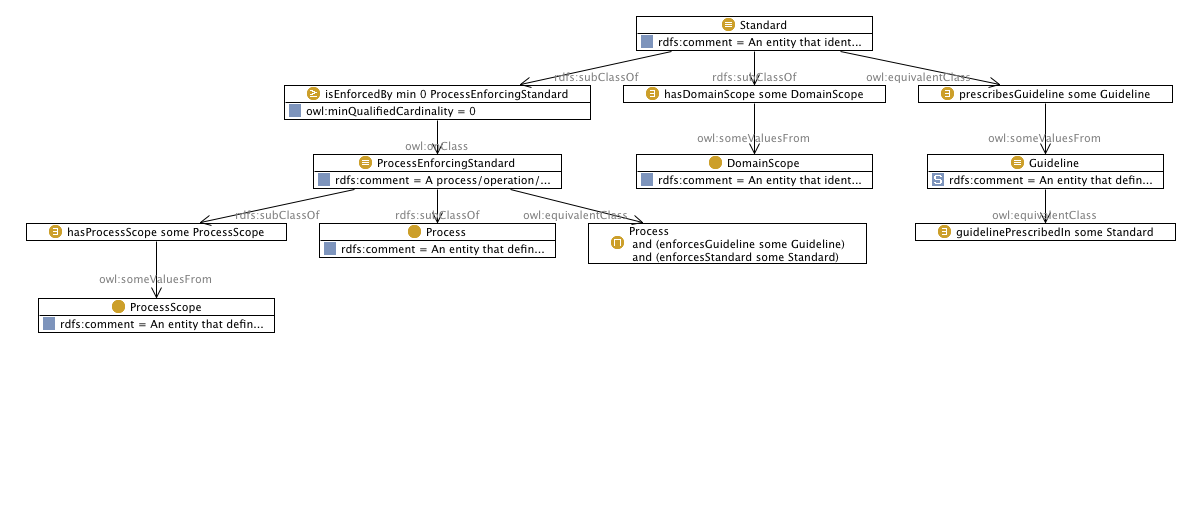Submissions:Standard Enforcer Pattern
From Odp
(Submission to WOP:2012) |
m (Review has been assigned.) |
||
| Line 76: | Line 76: | ||
|Event=WOP:2012 | |Event=WOP:2012 | ||
}} | }} | ||
| + | [[Category:Review assigned]] | ||
Revision as of 08:19, 14 August 2012

| If you are a member of quality committee please visit the
If you are author of this proposal or you want to contribute to this pattern's review, you can: specify if this revision takes in account any of the review(s) In general, it could be useful to visit the evaluation section to have information about the evaluation process of this proposal Current revision ID: 11147 |
Graphical representation
Diagram
General description
| Name: | Standard Enforcer Pattern |
|---|---|
| Submitted by: | MonikaSolanki |
| Also Known As: | SEP |
| Intent: | The remit of the SEP content pattern is to represent the relation between standards and the processes, operations, activities and services that enforce them, the domains they cater to and the scope of that specific process, operation, activity, service within the context of the domain. |
| Domains: | |
| Competency Questions: |
|
| Solution description: | SEP provides a mechanism to ontologically declare the conformance of a
process with one or more standards. The pattern is flexible and compositional. It can be exploited to include few or more guidelines from multiple standards and can be easily combined with other patterns. |
| Reusable OWL Building Block: | http://windermere.aston.ac.uk/~monika/ontologies/Standards-Enforcer-Pattern.owl (1043) |
| Consequences: | The pattern can be applied to use cases in all those domains where a standard is enforced to regulate processes. The main advantage of this pattern is that it provides the capability to link processes, operations, activities and services to their governing standards in a generic and compositional manner. In some scenarios it is possible that a process or an operation does not enforce all prescribed guidelines but enforces atleast some. The pattern accounts for that through the definition of the process enforcing the standard. |
| Scenarios: | As an exemplifier for SEP, we present a use case from the domain of algal biomass production which depicts the application of SEP to an ontology that models algal biomass production. The Minimum Descriptive Language (MDL) standard proposed by the Algal Biomass Association is enforced by the production operation. MDL recommends a set of descriptive metrics to uniformly characterise the analysis of large scale algal operations. In this use case, the ontology defines the concepts and relationships for the operation and incorporates SEP by enforcing a guideline for measuring Carbon input to the operation. |
| Known Uses: | |
| Web References: | |
| Other References: | |
| Examples (OWL files): | |
| Extracted From: | |
| Reengineered From: | |
| Has Components: | |
| Specialization Of: | |
| Related CPs: |
Elements
The Standard Enforcer Pattern Content OP locally defines the following ontology elements:
Additional information
This ontology models the standards enforcer pattern (SEP). The main advantage of this pattern is that it provides the capability to link processes operation and activities to their governing standards in a generic way. The pattern can be applied to all those use cases where a standard is enforced.
Scenarios
No scenario is added to this Content OP.
Reviews
| Review article | Posted on | About revision (current is 11147) |
|---|---|---|
| IonelVirgilPop about Standard Enforcer Pattern | 245616424 August 2012 | 1114911,149 |
| GerdGroener about Standard Enforcer Pattern | 245617030 August 2012 | 1114911,149 |
| BorisVillazón-Terrazas about Standard Enforcer Pattern | 245617030 August 2012 | 1121011,210 |
This revision (revision ID 11147) takes in account the reviews: none
Other info at evaluation tab
Modeling issues
There is no Modeling issue related to this proposal.
References
| | Submission to event |
|---|


